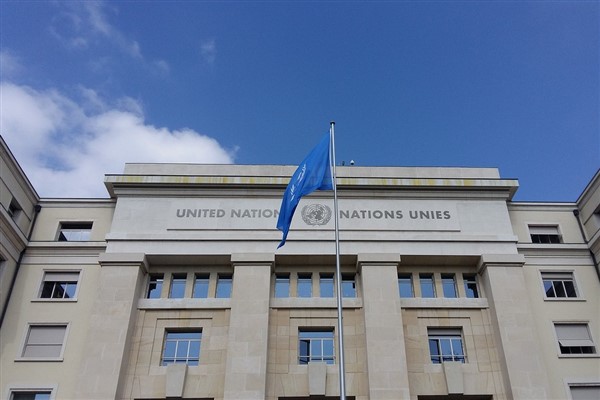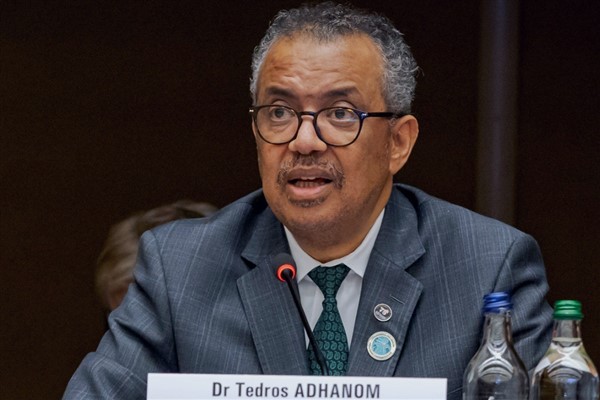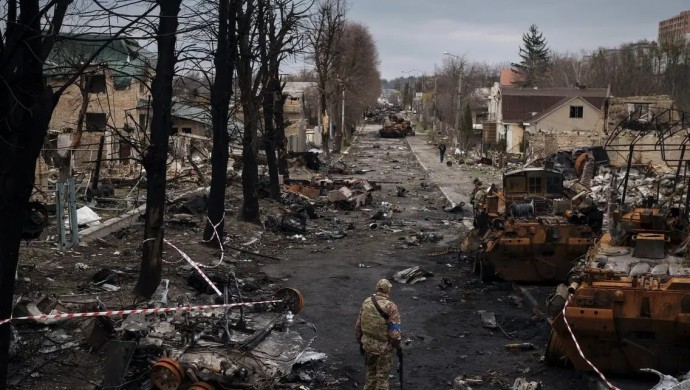SWIFT sanction and its scope… The US has taken the decision to kick Russia out of the SWIFT financial messaging system through the invasion of Ukraine, on a tactical scale, for now, as the European allies were keen on the unlikely idea of imposing a penalty a few days ago. Within the scope of the targeted and functional progress strategy, it is useful to analyze the overall financial sanction effect, especially on Russia, except that it still remains within the framework of a sanction covering certain Russian banks in order not to harm the energy supply network of countries such as Germany.
SWIFT and economic relations… According to the sanctions; For a US financial institution to engage in authorized transactions (for example, an energy-related fund transfer), all such fund transfers must be processed indirectly through a non-sanctioned, non-US financial institution. From this perspective, the option of a country without a third sanction leaves the matter in the middle. You might think that Russia might have a chance to evaluate the possibility of transferring funds through a country without sanctions, for example, China. This allows fund transfers that cannot be made with Russia's major banks, either through a sanction-free bank or an unsanctioned ally country. There is a possibility that the option of a third country will be blocked in this respect: the USA can impose sanctions on such countries as well.
EU countries, including Germany, France and Italy, are pressing the bloc to find ways to protect their economies if the Western alliance imposes sanctions on Russia. Some member states have expressed concern about the consequences of imposing sanctions on certain sectors such as energy, raw materials and banks. For this reason, it seems that certain problems will arise in the blockage of financial and commercial relations with Russia. Overcoming the bottleneck in the system with Western banks that have access and operation to Russian markets can also be considered as an option. SocGen operates in Russia through its Rosbank PJSC unit, making it among the largest European banks in the country, along with Italy's UniCredit SpA and Austria's Raiffeisen Bank International AG. According to SocGen's website, Moscow-based Rosbank has 550 branches, more than 3.1 million customers, and makes a relatively small contribution to the bank's overall earnings. Goldman Sachs Group Inc. and Citigroup Inc. are among the Wall Street firms with operations in the country.
U.S. sanctions against Russia after it first annexed Crimea in 2014 targeted only certain individuals or were limited to certain industries or financial products, allowing Rosbank to continue operating there. European Union sanctions were only against individuals or certain organizations. Sanction violations alone cost SocGen more than $1 billion in fines by US regulators in 2018. Some European banks, such as UniCredit, have recently withdrew potential expansion in Russia due to geopolitical uncertainty.
Russian financial institutions using SWIFT… In December 1989, Vnesheconombank became the first SWIFT member in the former Soviet Union. From 1992 the number of Russian users began to increase more actively, and by the beginning of 1998 their number exceeded two hundred. The 1998 crisis reduced the number of new SWIFT members; however, since 1999, the number of Russian users has been constantly increasing. Currently, 300 leading Russian banks and organizations are SWIFT users. Russia ranks second after the United States in the number of SWIFT users.
Russian banks generally use US and German banks as correspondent banks. These fund transfers generally consist of revenues from energy trade, and at this stage, a significant portion of oil revenues are transferred over the SWIFT system in dollars.
Alternative systems to SWIFT… Although Russia's SPFS is three times cheaper than SWIFT, the network itself only works during weekday working hours and its messages are limited to 20 kb. Meanwhile, SWIFT works 24/7 and allows 10mb to be transmitted over its network. SPFS is the Russian equivalent of SWIFT and has been developed by the Central Bank of Russia since 2014 after the US government threatened to separate Russia from the SWIFT system. As of March 2018, more than 400 Russian entities (mostly banks) are part of the network. This means that the SPFS system supports intra-Russia transactions, but the problem with any SWIFT disconnections will be the lack of international connections. Then the question arises of how quickly Russia can integrate SPFS with other systems and whether the US can also impose sanctions on countries that depend on SPFS. When transactions are made with dollars in the SWIFT system, these transactions must automatically go through the US system. This paves the way for the US to monitor transactions and interfere with money transfers. Since the most important reserve currency is the dollar, America indirectly imposes its own sanctions on world trade. Even if America does not remove it from the SWIFT system, it may prevent important economic players of Russia from trading with the dollar.
In fact, there are plans to integrate the Russian SPFS network with the China-based Cross-Border Interbank Payment System (CBIBPS), while the Russian government is also in talks to expand SPFS to developing countries such as Turkey and Iran. Since 2019, many agreements have been reached to connect SPFS to the payment systems of other countries in China, India, Iran, as well as to countries within the Eurasian Economic Union (EAEU), which includes Armenia, Belarus, Kazakhstan, Kyrgyzstan. The EAEU also has Free Trade Agreements with Serbia, Singapore and Vietnam, and many other agreements are pending. At the end of 2020, 23 foreign banks from Armenia, Belarus, Germany, Kazakhstan, Kyrgyzstan and Switzerland were connected to SPFS.
An additional unknown is how quickly and how extensively the Russian SPFS system can be fully integrated with other systems such as China's CBIBPS. US intelligence - Based on the lack of awareness in Afghanistan, it may also have underestimated the SPFS's ability to adapt. This is of course possible.
Mir is also a possible option, designed as a way to overcome potential electronic payment blocks after many Russian banks have been deprived of their services due to sanctions imposed by US-based Visa and MasterCard. It is currently mostly accepted by Russia-based companies such as Aeroflot and Russian Railways, but is slowly gaining acceptance among foreign companies with Russian subsidiaries. Banks are reluctant to use Mir cards for fear that their cost may be higher compared to cards from more established payment systems.
Digital rubles, cryptocurrencies and barter are taken as other options. By excluding the last; As a result of the difference between digital money and crypto money, it is possible in theory, but there is a technological infrastructure requirement for the digital ruble. It is not possible for other countries to accept this, as there will be excessive volatility and low liquidity in the ruble and crypto currency conversion.
Economic impact analyzes… Forecasts on this subject reveal that Russia will go through a period of economic distress and that disrupted payment systems may have a multilateral impact on the global financial system. In late August 2014, according to media reports, the UK had proposed to ban Russia from the SWIFT network as part of upcoming new sanctions against Moscow for its stance on Ukraine. Kudrin, the former Finance Minister at the time, said that a possible decision to block Russia's access to the SWIFT international banking transaction system could cause Russia's GDP to shrink by 5%. When we look at the economic growth trend of Russia over the years, 2009 – 2015 and 2020 come to the fore as the years of GDP contraction. The economy, which shrank by 11% in 2009 due to the Lehman Brothers crisis that surrounded the whole world, contracted by around 3% with the 2015 Ukraine crisis and sanctions. Since the story in 2020 is already related to Covid, it does not need to be mentioned separately. While the two bottoms of the economy are seen in 2009 and 2020, the bottom in 2015 is not that low and the growth trend has also increased from 2016 to 2019.
Of course, it is necessary to evaluate the effects of payment delays, the slowing trade network and the financial sector crisis together. Accordingly, global system players doing business with the Russian side in this transaction will also suffer due to the restrictions on transfers, one side of which is the Russian financial system. For this reason, in order to obtain a harmless result, sanctions are applied on the basis of selected financial players. You can also impose sanctions on all financial actors in the country, but in a country like Russia that has very complex relations in world trade, pushing all financial institutions out of the system will catch all parties unprepared and harm many countries. Even embarking on such a path is an important aspect for economic players.

Annual GDP growth in Russia… Source: Bloomberg
Conclusion? The sanctions, which focused on the financial and economic area in 2014, did not pull Russia back much and Russia is in a more advanced position compared to those days. If we recall, at that time, restrictions were imposed on both the assets and monetary movements of several state officials and oligarchs. Staying out of SWIFT may cause Russia to consider entering an alternative system such as SPFS. Against such a situation, the US can be expected to consider an option such as imposing sanctions on countries that choose SPFS.
In fact, the event may manifest as a new financial system movement or a financial system crisis that will involve many countries. I think separating all payment systems would be like a sharp knife. In fact, the issue between SWIFT and SPFS should not be viewed only as a technological competence. In the end, even if SPFS improves its technological capacity; Firstly, SWIFT is a monopoly of international money transfer, and it makes no sense unless many countries use SPFS. Second, the belief that Russian sanctions over SPFS have been exceeded may expose global financial system players to future sanctions or penalties by the US regulator.
Kaynak Tera Yatırım
Hibya Haber Ajansı
























